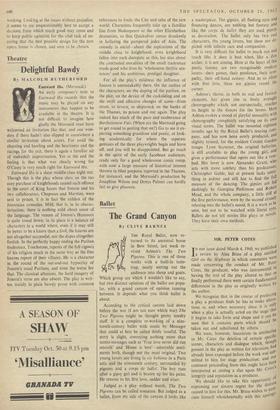Theatre
Delightful Bawdy
y MALCOLM RUTHERFORD
Eastward Ho. (Mermaid.) AN early composer's note to Eastward Ho records that the music may be played on any instruments that happen to be available in the theatre. It is not difficult to imagine hem gladly the Mermaid must have welcomed an invitation like that, and one won- ders if there hadn't also slipped in somewhere a similar invitation about actors. For amid the shouting and bawling and the heartiness and the racings for the exit, there is again a familiar air of makeshift improvisation. Yet at the end the feeling is that what was clearly wrong for O'Casey is very much right for Eastward Ho.
Eastward Ho is a sheer middle-class night out. Though this is the play whose slurs on the too easy purchase of knighthoods caused such offence to the court of King James that Jonson and his two collaborators, Chapman and Marston, were sent to prison, it is in fact the mildest of the Jonsonian comedies. Mild, that is, in its charac- terisation; there is nothing mild about some of the language. The venom of Jonson's Humours is quite toned down; in its place is a balance of characters in a world where, even if it may still be better to be a knave than a fool, the knaves are not altogether successful, nor the dupes altogether foolish. In the perfectly happy ending the Puritan tradesman, Touchstone, repents of the full, rigours of his religion much in the same way as the free knaves repent of their villainy. He is a character in the round of the out-and-out hypocrisy of Jonson's usual Puritans, and none the worse for that. The classical allusions, the hard imagery of Jonson's verse are also absent. The play is writ- ten mainly in plain bawdy prose with common references to trade, the City and tales of the new world. Characters frequently take up a familiar line from Shakespeare or the other Elizabethan dramatists, so that Quicksilver comes drunkenly in hollering the pampered jades of Asia. The comedy is social—about the aspirations of the middle class to knighthood, even knighthood fallen into such disrepute as this, but also about the contrasted moralities of the small tradesman made good who lives by 'wholesome thriftie sen- tences' and his ambitious, prodigal daughter.
For all the play's mildness the influence of Jonson is unmistakably there. On the outline of the characters, on the duping of the puritan, on the plot, on the device of the cuckolding and on the swift and effective changes of scene—from street, to tavern, to shipwreck on the banks of the Thames, to prison and out again. The play indeed has much of the pace and exuberance of Bartholomew Fair. (When are the Mermaid going to get round to putting that on?) Go to see it ex- pecting something grandiose and poetic, or look- ing academically for where the separate geniuses of the three playwrights begin and leave off, and you will be disappointed. But go much in the spirit of the early Jacobean audiences, ready only for a good wholesome comic romp, with now a large measure of historical interest thrown in (that porpoise reported in the Thames, for instance), and the Mermaid's production by Josephine Wilson and Denys Palmer can hardly fail to give pleasure.














































 Previous page
Previous page